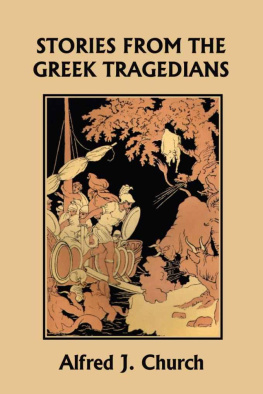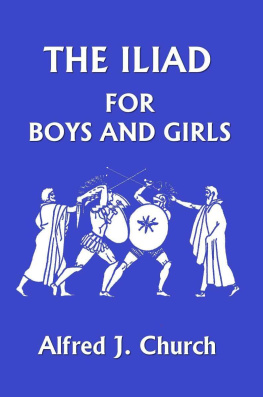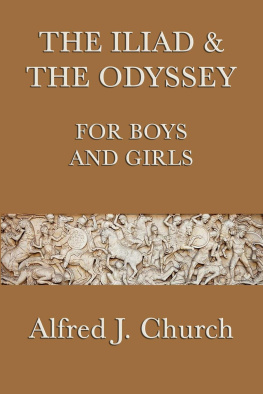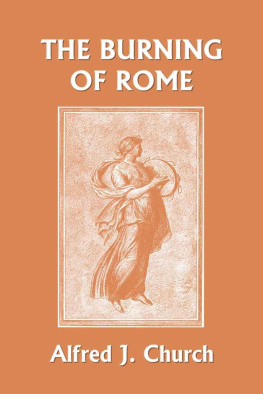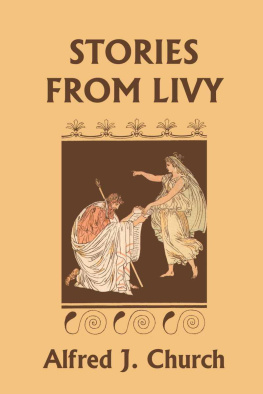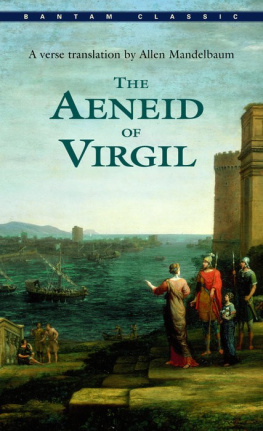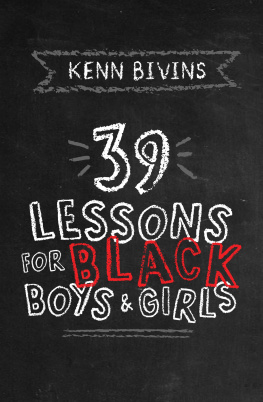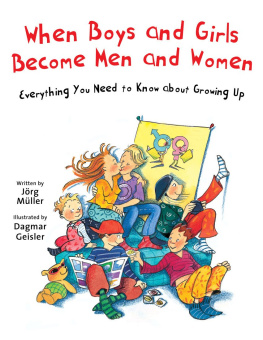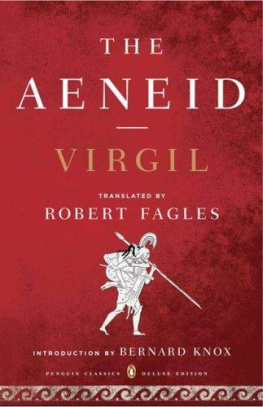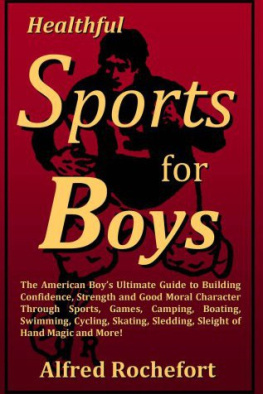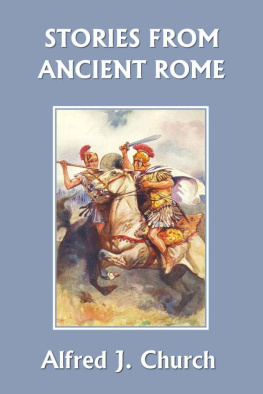Alfred J. Church - The Aeneid for Boys and Girls
Here you can read online Alfred J. Church - The Aeneid for Boys and Girls full text of the book (entire story) in english for free. Download pdf and epub, get meaning, cover and reviews about this ebook. year: 2006, publisher: Yesterdays Classics, genre: Adventure. Description of the work, (preface) as well as reviews are available. Best literature library LitArk.com created for fans of good reading and offers a wide selection of genres:
Romance novel
Science fiction
Adventure
Detective
Science
History
Home and family
Prose
Art
Politics
Computer
Non-fiction
Religion
Business
Children
Humor
Choose a favorite category and find really read worthwhile books. Enjoy immersion in the world of imagination, feel the emotions of the characters or learn something new for yourself, make an fascinating discovery.
- Book:The Aeneid for Boys and Girls
- Author:
- Publisher:Yesterdays Classics
- Genre:
- Year:2006
- Rating:3 / 5
- Favourites:Add to favourites
- Your mark:
- 60
- 1
- 2
- 3
- 4
- 5
The Aeneid for Boys and Girls: summary, description and annotation
We offer to read an annotation, description, summary or preface (depends on what the author of the book "The Aeneid for Boys and Girls" wrote himself). If you haven't found the necessary information about the book — write in the comments, we will try to find it.
The Aeneid for Boys and Girls — read online for free the complete book (whole text) full work
Below is the text of the book, divided by pages. System saving the place of the last page read, allows you to conveniently read the book "The Aeneid for Boys and Girls" online for free, without having to search again every time where you left off. Put a bookmark, and you can go to the page where you finished reading at any time.
Font size:
Interval:
Bookmark:
All rights reserved. No part of this book may be reproduced or retransmitted in any form or by any means without the written permission of the publisher.
This edition, first published in 2010 by Yesterday's Classics, an imprint of Yesterday's Classics, LLC, is an unabridged republication of the work originally published by The Macmillan Company in 1908. This title is available in a print edition (ISBN 978-1-59915-060-4).
Yesterday's Classics republishes classic books for children from the golden age of children's literature, the era from 1880 to 1920. Many of our titles are offered in high-quality paperback editions, with text cast in modern easy-to-read type for today's readers. The illustrations from the original volumes are included except in those few cases where the quality of the original images is too low to make their reproduction feasible. Unless specified otherwise, color illustrations in the original volumes are rendered in black and white in our print editions.
T HE Greeks besieged the city of Troy for nearly ten years. They could not take it because the walls were so high and strongsome said that they had been built by the hands of godsbut they kept the Trojans inside. This had not always been so. There had been a time when the Trojans had gone out and fought with their enemies on the plain, sometimes they had beaten them in battle, and once they had very nearly burnt their ships. But this was all changed. They had lost some of the bravest of their chiefs, such as Hector, the best of the sons of Priam, and Paris the great archer, and many great princes, who had come from the countries round about to help them.
We can easily believe then that Priam, King of Troy, and his people were very glad to hear that one day the Greeks had gone home. Two Trojans, who had left the city two weeks or so before on a message from King Priam to one of his allies, came back saying that they had gone to the camp of the Greeks and had found it empty, and that there were no ships to be seen. Every one who was not ill or too old to move about made all the haste they could to get out of the city. The gates were opened wide for the first time during ten years, and men, women, and children hurried out to see the plain where so many battles had been fought, and the camp in which the enemy had lived, and the place where the ships had been dragged up on the shore. As you may suppose, those who had fought in the battles had a great deal to say about what they had done and what they had seen. There were many things to see, but the strangest one of all was a great Horse of Wood, which was standing not far from the walls of the city. No one was quite sure what it was, or what it meant. One man said: "It is a very curious thing. Let us drag it into the city that it may be a monument of all that we have suffered for the last ten years." Others said: "Not so; we had better burn it, or drag it down to the sea that the water may cover it, or cut it open to see whether there is anything inside." Of these no one was more vehement than Laocon, priest of Neptune. "Take heed what you do, men of Troy," he cried. "Who knows whether the Greeks have really gone away? It may be that there are armed men inside this Horse; it may be that it has been made so big to overtop the walls of the city. Anyhow I am afraid of these Greeks, even when they give us gifts." And as he spoke, he threw the spear which he had in his hand at the Horse of Wood, and struck it on the side. A great rattling sound was heard, and the Trojans, if they had not been very blind and foolish, might have known that there was something wrong.
While the dispute was going on, some shepherds came up, bringing with them a man whose hands were bound behind his back. He had come out from a hiding-place, they said, of his own accord, when they were in the field. The young Trojans crowded round him, and began to mock at him, but he cried out in a very piteous voice: "What shall I do? where shall I go? the Greeks will not let me live, and the Trojans cry out for vengeance upon me." Then they began to pity him, and they bade him say who he was and what he had to tell.
Then the man turned to King Priam, and said: "I will speak the truth, whatever may happen to me. My name is Sinon, and I will not deny that I am a Greek. Perhaps you have heard of one Palamedes. The Greeks put him to death, saying that he was a traitor; but his only fault was that he wanted to have peace. Yes, they put him to death, and now that he is dead, they are sorry. I was a cousin of his, and my father sent me with him to Troy. So long as he prospered, I prospered also; but when he was done to death by the false witness of Ulysses, I fell into great grief and trouble, nor could I be silent; I swore that if ever I got back to Argos, I would have revenge on those who had brought him to his death. So Ulysses was always on the look-out to do me some harm; and at the last by the help of Calchas the prophetbut why do I tell you of these things? Doubtless you hold one Greek as bad as another. Kill me, if you will; only remember that this is the very thing which the two sons of Atreus wish, the very thing which Ulysses himself would give much money to secure."
Then the Trojans said: "Tell us more." And he went on. "Many times would the Greeks have gone home, for they were very tired of the war, but the sea was so stormy that they dared not go. Then they made this great Horse of Wood which you see, but the storms grew worse and worse. Then they sent to ask Apollo what they should do. And Apollo said: 'Men of Greece, when you came here you had to appease the winds with blood, and you must appease them with blood again when you go away.' Every one trembled when they heard this, for every one feared that it might be his blood that would be wanted. After a while Ulysses brought the prophet into the assembly of the people, and said: 'Tell us now who is it that the gods will have for a victim?' Then many thought that it was I against whom Ulysses was plotting. For nine days the prophet said nothing: 'He would not give any Greek,' he said, 'to death.' These were his words, but in truth he and Ulysses had plotted the whole thing between them. On the tenth day he spoke, and said: 'Sinon is the man.' To this all agreed, every man thinking, 'Well, it is not I that shall die.' So they fixed a day on which I was to be sacrificed, and made everything ready. But before it came, I broke my chains and escaped, hiding myself in the reeds of a pond, till they should set sail. And now I shall never see my own country again; no, nor my wife and children, and, doubtless, these cruel men will take vengeance on them because I escaped. And now I beseech you, O King, to have pity on me, for I have suffered much, though, indeed, I have not done harm to any man."
Then King Priam had pity on him and bade them unbind his hands, saying: "Forget your own people; from to-day you are one of us. But tell us now, why did the Greeks make this great Horse of Wood that we see?"
Then Sinon lifted up his hands to the sky and said: "O sun and moon and stars, I call you to witness that I have a good right to tell the secrets of my countrymen. Listen, O King. From the beginning, when the Greeks first came to this place, their hope has been in the help of Minerva. But she was angry with them for this cause. Ulysses and Diomed made their way into your city, and climbed into the citadel, and killed the guards. And then with hands all bloody from the slaughter, they laid hold of her image and carried it away. It was this that made the goddess angry, that they should dare to touch her with hands stained with blood. I saw with my own eyes how the eyes of the image, when these two brought it into the camp, flashed with anger, and how the drops of sweat stood upon it; yes, and how it leapt three times from the ground, shaking shield and spear. Then the prophet said: 'You must go back to Greece, and come again, and begin the war again, if you wish to take the city of Troy'and this they are doing now; they have gone back to Greece, and they will soon return. Furthermore, he said: 'You must make a Horse of Wood to be a peace-offering to Minerva. Make it, I advise you, very great, so that the Trojans may not take it within their walls. For, if they do so take it, then you will never conquer their city. Nay, they will come to our own land, and lay siege to our cities, and our children will suffer the things which we have sought to bring on them. But if they hurt the thing, then they themselves shall perish.' "
Font size:
Interval:
Bookmark:
Similar books «The Aeneid for Boys and Girls»
Look at similar books to The Aeneid for Boys and Girls. We have selected literature similar in name and meaning in the hope of providing readers with more options to find new, interesting, not yet read works.
Discussion, reviews of the book The Aeneid for Boys and Girls and just readers' own opinions. Leave your comments, write what you think about the work, its meaning or the main characters. Specify what exactly you liked and what you didn't like, and why you think so.


